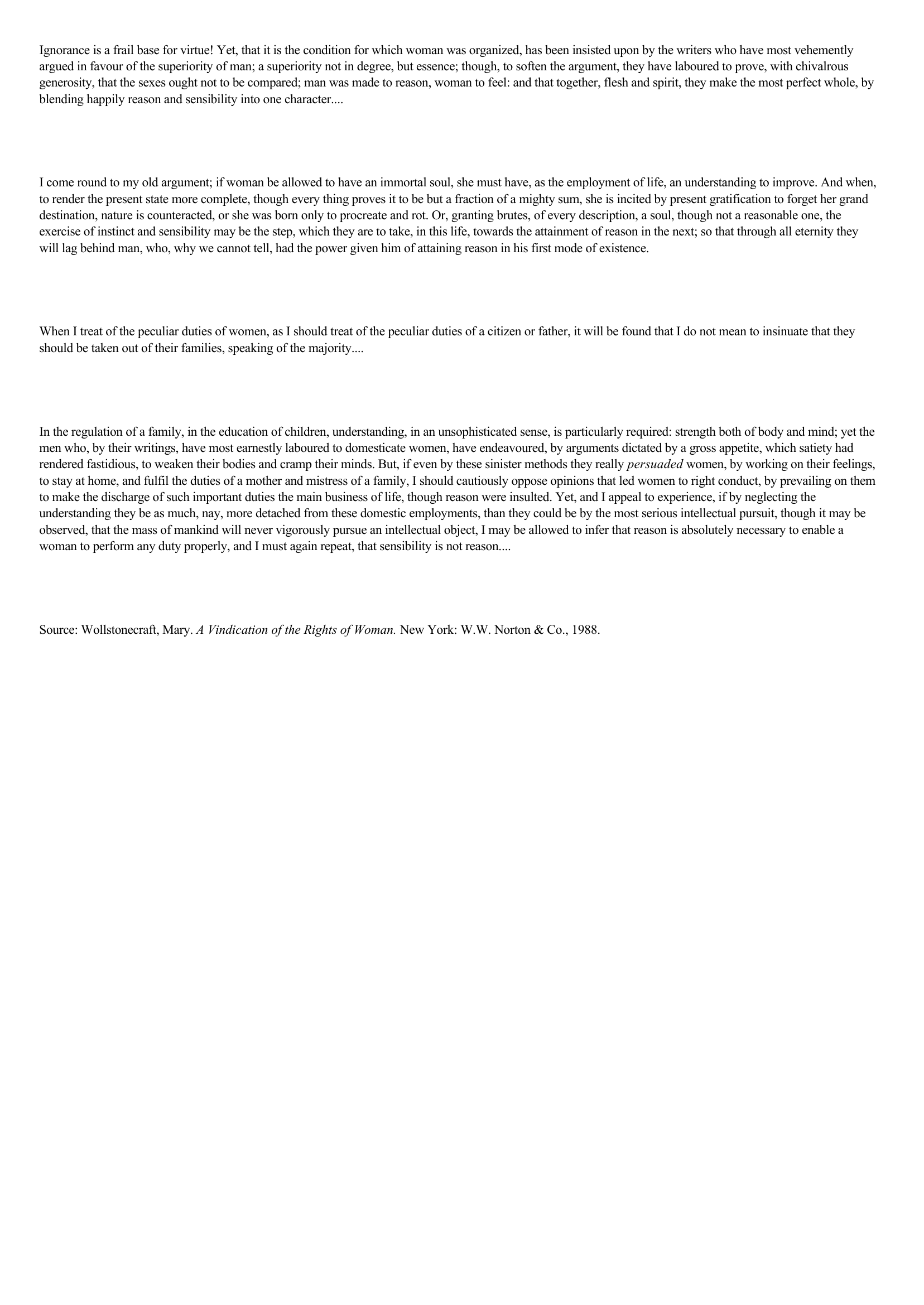From A Vindication of the Rights of Woman - anthology.
Publié le 12/05/2013

Extrait du document
«
Ignorance is a frail base for virtue! Yet, that it is the condition for which woman was organized, has been insisted upon by the writers who have most vehementlyargued in favour of the superiority of man; a superiority not in degree, but essence; though, to soften the argument, they have laboured to prove, with chivalrousgenerosity, that the sexes ought not to be compared; man was made to reason, woman to feel: and that together, flesh and spirit, they make the most perfect whole, byblending happily reason and sensibility into one character....
I come round to my old argument; if woman be allowed to have an immortal soul, she must have, as the employment of life, an understanding to improve.
And when,to render the present state more complete, though every thing proves it to be but a fraction of a mighty sum, she is incited by present gratification to forget her granddestination, nature is counteracted, or she was born only to procreate and rot.
Or, granting brutes, of every description, a soul, though not a reasonable one, theexercise of instinct and sensibility may be the step, which they are to take, in this life, towards the attainment of reason in the next; so that through all eternity theywill lag behind man, who, why we cannot tell, had the power given him of attaining reason in his first mode of existence.
When I treat of the peculiar duties of women, as I should treat of the peculiar duties of a citizen or father, it will be found that I do not mean to insinuate that theyshould be taken out of their families, speaking of the majority....
In the regulation of a family, in the education of children, understanding, in an unsophisticated sense, is particularly required: strength both of body and mind; yet themen who, by their writings, have most earnestly laboured to domesticate women, have endeavoured, by arguments dictated by a gross appetite, which satiety hadrendered fastidious, to weaken their bodies and cramp their minds.
But, if even by these sinister methods they really persuaded women, by working on their feelings, to stay at home, and fulfil the duties of a mother and mistress of a family, I should cautiously oppose opinions that led women to right conduct, by prevailing on themto make the discharge of such important duties the main business of life, though reason were insulted.
Yet, and I appeal to experience, if by neglecting theunderstanding they be as much, nay, more detached from these domestic employments, than they could be by the most serious intellectual pursuit, though it may beobserved, that the mass of mankind will never vigorously pursue an intellectual object, I may be allowed to infer that reason is absolutely necessary to enable awoman to perform any duty properly, and I must again repeat, that sensibility is not reason....
Source: Wollstonecraft, Mary.
A Vindication of the Rights of Woman. New York: W.W.
Norton & Co., 1988..
»
↓↓↓ APERÇU DU DOCUMENT ↓↓↓
Liens utiles
- The 1960’s and the American Woman: the transition from the “housewife” to the feminist
- From Bulfinch's Mythology: The Unicorn - anthology.
- From Bulfinch's Mythology: The Trojan War - anthology.
- From Bulfinch's Mythology: The Phoenix - anthology.
- From Bulfinch's Mythology: The Golden Fleece - anthology.


